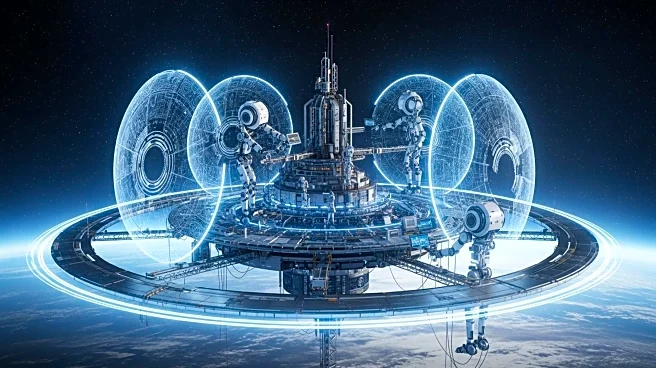What's Happening?
Amazon founder Jeff Bezos, during a public appearance at Italian Tech Week in Turin, forecasted that millions of people will be living in space within the next couple of decades. Bezos, who also founded the rocket company Blue Origin, suggested that space habitation will be driven by personal choice, with robots performing laborious tasks and AI data centers operating in space. This prediction comes amidst ongoing discussions about space colonization, notably by Elon Musk, who has proposed Mars colonization by 2050. Additionally, Bezos defended the current AI investment surge, describing it as an 'industrial' bubble rather than a 'financial' one, indicating optimism about technological advancements.
Why It's Important?
Bezos's predictions highlight significant potential shifts in human habitation and technological reliance. The prospect of space colonization could transform industries related to space travel, robotics, and AI, potentially creating new economic opportunities and challenges. The emphasis on AI as an 'industrial' bubble suggests a focus on long-term technological infrastructure rather than short-term financial gains, which could influence investment strategies and policy decisions. These developments may impact sectors such as aerospace, technology, and global economic dynamics, with implications for workforce demands and international collaboration.
What's Next?
The vision of space colonization and AI expansion may prompt increased investment in related technologies and infrastructure. Stakeholders, including governments, private companies, and research institutions, might accelerate efforts to develop sustainable space habitats and advanced AI systems. Potential regulatory frameworks and international agreements could emerge to address the ethical and logistical aspects of space living and AI deployment. Public and private sectors may need to collaborate to ensure responsible and equitable advancements in these areas.
Beyond the Headlines
The ethical implications of space colonization and AI reliance warrant consideration. Issues such as resource allocation, environmental impact, and societal equity could arise as space becomes a potential living environment. The role of AI in managing space habitats and labor raises questions about human oversight and control. Long-term cultural shifts may occur as humanity adapts to new living conditions and technological dependencies, potentially redefining societal norms and values.









